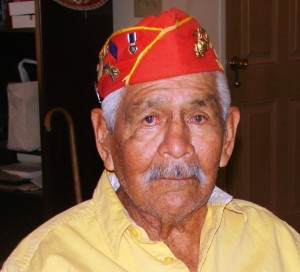Navajo Code Talker’s Day
 August 14 is National Navajo Code Talker’s Day. It hasn’t always been so. Although the “original 29” who created the military code attended boot camp in May 1942, and they along with nearly 400 other Navajo Code Talkers helped the United States military win World War II by the end of 1945, the group “received no recognition until the declassification of the operation in 1968.”
August 14 is National Navajo Code Talker’s Day. It hasn’t always been so. Although the “original 29” who created the military code attended boot camp in May 1942, and they along with nearly 400 other Navajo Code Talkers helped the United States military win World War II by the end of 1945, the group “received no recognition until the declassification of the operation in 1968.”
On July 28, 1982, President Reagan declared August 14 National Navajo Code Talker’s Day. It was September 17, 1992 when the Pentagon recognized the Code Talkers’ contribution. This delay was reportedly due to the “continued value of their language as a security classified code.” It was December 21, 2000 that President Clinton signed into law the statute awarding the original 29 Navajo Code Talkers with Congressional Gold Medals – the highest civilian award in the United States. And it was July 2001, when President Bush personally presented the Congressional Medal to four surviving Navajo code talkers in the Capitol Rotunda in Washington, DC. The fifth living code talker of the original 29 was unable to attend. Gold medals were also presented to relatives of the 24 code talkers no longer living.
The Navajo code talkers were commended for their skill, speed, and accuracy. Major Howard Connor, 5th Marine Division signal officer, had 6 Navajo code talkers working 24×7 during the first two days of the Battle of Iwo Jima. They sent and received over 800 messages, all without error. Connor was later quoted as saying, “Were it not for the Navajo, the Marines would never have taken Iwo Jima.”
 In an earlier blog post for Veteran’s Day, I mentioned the various other tribes that served as code talkers in times of war and shared a great video honoring the Navajo Code Talkers. I hope you’ll take a minute to revisit that post today. We’ve also been talking about our home improvement service for Native American Elders – and today reminded me that NRC was able to help a Navajo Code Talker in Cornfield, AZ, who was in need of an ADA home improvement.
In an earlier blog post for Veteran’s Day, I mentioned the various other tribes that served as code talkers in times of war and shared a great video honoring the Navajo Code Talkers. I hope you’ll take a minute to revisit that post today. We’ve also been talking about our home improvement service for Native American Elders – and today reminded me that NRC was able to help a Navajo Code Talker in Cornfield, AZ, who was in need of an ADA home improvement.
Early in his WWII career, Edward received a serious injury to the leg and spent many months in the hospital before he could walk again. Although he worked for the railroad and other employers after the military, the leg injury always bothered him and ultimately created a crisis. The leg had permanently stiffened and become unbendable. Navigating through his home in a wheelchair with his leg stretched out in front of him was a major challenge, as was getting dressed or getting in and out of the shower. This also created hardships for his daughters who took turns as caretakers when Edward was at home, in between their shifts at work. Due to this mix of challenges, Edward was forced to spend much of his time at a V.A. facility in Phoenix, which provided good care but left him homesick and missing his grandchildren. When NRC learned of his predicament, we wanted to help. Through our home improvement service, we were able to widen the doors to his bathroom and kitchen, widen the hallway where he entered the home, and put a ramp at the back door entrance so that Edward could sit in the back yard and enjoy some fresh air. He was very grateful for the ADA improvements to his home and was relieved that a burden was lifted for both him and his family. In earlier years, Edward attended many Code Talker gatherings. He was extremely proud of his military service and it was an honor to meet him.

